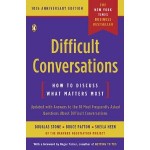 One of my favorite books on the subject of handling tough conversations and situations is Difficult Conversations: How to Discuss What Matters Most (Stone, Patton, Heen & Fisher, 2010). Based on 15 years of work at the Harvard Negotiation Project and consultations with thousands of people struggling to communicate effectively in tough situations, the authors answer the question: When people confront the conversations they dread the most, what works?
One of my favorite books on the subject of handling tough conversations and situations is Difficult Conversations: How to Discuss What Matters Most (Stone, Patton, Heen & Fisher, 2010). Based on 15 years of work at the Harvard Negotiation Project and consultations with thousands of people struggling to communicate effectively in tough situations, the authors answer the question: When people confront the conversations they dread the most, what works?
The authors contend that we get stuck in difficult conversations because we are generally making one or more fundamental mistakes; they then propose alternatives to these mistakes:
MISTAKE: We assume we are looking at factual matter, and that our view of the matter is the only correct one. We may agree on the facts but our interpretations of those facts are far apart.
GOAL: To move toward a “leaning conversation,” the parties must shift from certainty about their own views, to curiosity about the other’s views of the situation. Try to understand why the other party interprets the situation in the particular way they do. Acknowledge both your own views and their (differing) views.
MISTAKE: We assume we know what the other’s intentions are. In fact, these assumptions are often simply an extension of our own feelings (that is, “if I am feeling hurt, the other must have intended to hurt me”). We tend to think the worst of others, and the best of ourselves.
GOAL: Avoid making the leap from impact to intent. Instead, ask the other what his/her intent was, remaining open-minded about your own interpretation of that intent.
MISTAKE: We assume that once we explain that our intentions were benign, the other party has no reason to feel hurt.
SUGGESTION: Allow for the possibility that the motives for our own behavior were more complex (and possibly hurtful) than we like to admit. Acknowledge the other’s feelings.
MISTAKE: We focus on assigning blame, thereby inhibiting our ability to learn what is really causing the problem and to do anything meaningful to correct it.
SUGGESTION: Shift the discussion away from blame towards understanding each party’s contribution to the situation. Take joint responsibility, and discuss how to avoid future problems. Try using role reversal and adopting a disinterested perspective.